初中英语动词用法(全)
- 格式:doc
- 大小:265.00 KB
- 文档页数:22
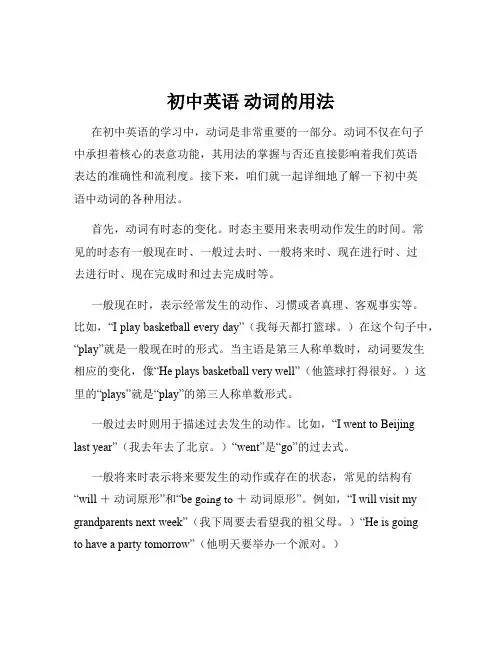
初中英语动词的用法在初中英语的学习中,动词是非常重要的一部分。
动词不仅在句子中承担着核心的表意功能,其用法的掌握与否还直接影响着我们英语表达的准确性和流利度。
接下来,咱们就一起详细地了解一下初中英语中动词的各种用法。
首先,动词有时态的变化。
时态主要用来表明动作发生的时间。
常见的时态有一般现在时、一般过去时、一般将来时、现在进行时、过去进行时、现在完成时和过去完成时等。
一般现在时,表示经常发生的动作、习惯或者真理、客观事实等。
比如,“I play basketball every day”(我每天都打篮球。
)在这个句子中,“play”就是一般现在时的形式。
当主语是第三人称单数时,动词要发生相应的变化,像“He plays basketball very well”(他篮球打得很好。
)这里的“plays”就是“play”的第三人称单数形式。
一般过去时则用于描述过去发生的动作。
比如,“I went to Beijing last year”(我去年去了北京。
)“went”是“go”的过去式。
一般将来时表示将来要发生的动作或存在的状态,常见的结构有“will +动词原形”和“be g oing to +动词原形”。
例如,“I will visit my grandparents next week”(我下周要去看望我的祖父母。
)“He is goingto have a party tomorrow”(他明天要举办一个派对。
)现在进行时强调正在进行的动作,其结构是“be +动词的现在分词”。
像“Look! They are playing football”(看!他们正在踢足球。
)“playing”就是“play”的现在分词形式。
过去进行时表示过去某个时刻正在进行的动作,结构为“was/were+动词的现在分词”。
比如,“I was reading a book at eight o'clock yesterday evening”(昨天晚上八点我正在读书。
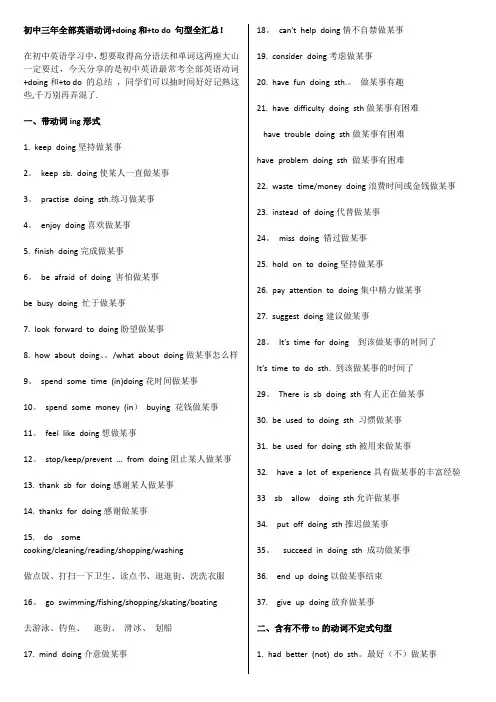
初中三年全部英语动词+doing和+to do 句型全汇总!在初中英语学习中,想要取得高分语法和单词这两座大山一定要过,今天分享的是初中英语最常考全部英语动词+doing和+to do 的总结,同学们可以抽时间好好记熟这些,千万别再弄混了.一、带动词ing形式1. keep doing坚持做某事2。
keep sb. doing使某人一直做某事3。
practise doing sth.练习做某事4。
enjoy doing喜欢做某事5. finish doing完成做某事6。
be afraid of doing 害怕做某事be busy doing 忙于做某事7. look forward to doing盼望做某事8. how about doing、。
/what about doing做某事怎么样9。
spend some time (in)doing花时间做某事10。
spend some money (in)buying 花钱做某事11。
feel like doing想做某事12。
stop/keep/prevent …from doing阻止某人做某事13. thank sb for doing感谢某人做某事14. thanks for doing感谢做某事15. do somecooking/cleaning/reading/shopping/washing做点饭、打扫一下卫生、读点书、逛逛街、洗洗衣服16。
go swimming/fishing/shopping/skating/boating去游泳、钓鱼、逛街、滑冰、划船17. mind doing介意做某事18。
can't help doing情不自禁做某事19. consider doing考虑做某事20. have fun doing sth.。
做某事有趣21. have difficulty doing sth做某事有困难have trouble doing sth做某事有困难have problem doing sth 做某事有困难22. waste time/money doing浪费时间或金钱做某事23. instead of doing代替做某事24。
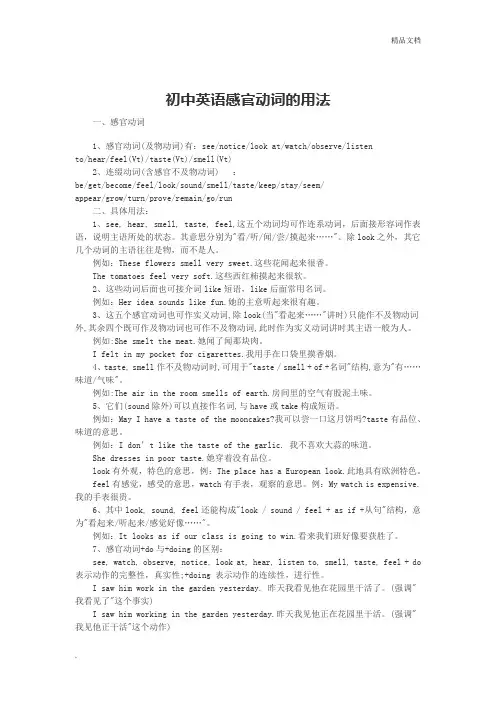
初中英语感官动词的用法一、感官动词1、感官动词(及物动词)有:see/notice/look at/watch/observe/listento/hear/feel(Vt)/taste(Vt)/smell(Vt)2、连缀动词(含感官不及物动词) :be/get/become/feel/look/sound/smell/taste/keep/stay/seem/appear/grow/turn/prove/remain/go/run二、具体用法:1、see, hear, smell, taste, feel,这五个动词均可作连系动词,后面接形容词作表语,说明主语所处的状态。
其意思分别为"看/听/闻/尝/摸起来……"。
除look之外,其它几个动词的主语往往是物,而不是人。
例如:These flowers smell very sweet.这些花闻起来很香。
The tomatoes feel very soft.这些西红柿摸起来很软。
2、这些动词后面也可接介词like短语,like后面常用名词。
例如:Her idea sounds like fun.她的主意听起来很有趣。
3、这五个感官动词也可作实义动词,除look(当"看起来……"讲时)只能作不及物动词外,其余四个既可作及物动词也可作不及物动词,此时作为实义动词讲时其主语一般为人。
例如:She smelt the meat.她闻了闻那块肉。
I felt in my pocket for cigarettes.我用手在口袋里摸香烟。
4、taste, smell作不及物动词时,可用于"taste / smell + of +名词"结构,意为"有……味道/气味"。
例如:The air in the room smells of earth.房间里的空气有股泥土味。
5、它们(sound除外)可以直接作名词,与have或take构成短语。
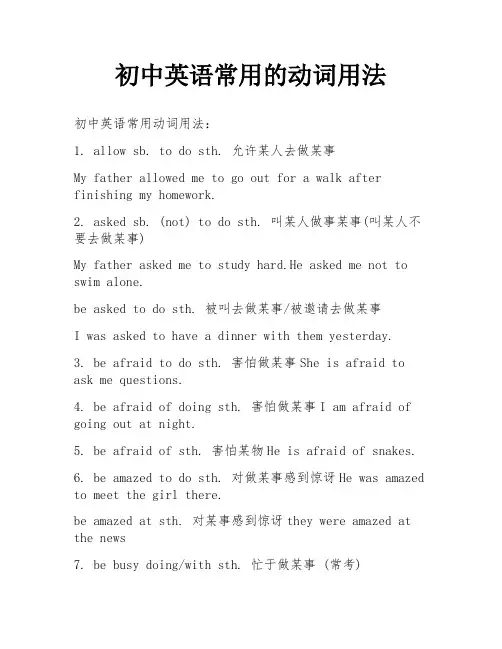
初中英语常用的动词用法初中英语常用动词用法:1. allow sb. to do sth. 允许某人去做某事My father allowed me to go out for a walk after finishing my homework.2. asked sb. (not) to do sth. 叫某人做事某事(叫某人不要去做某事)My father asked me to study hard.He asked me not to swim alone.be asked to do sth. 被叫去做某事/被邀请去做某事I was asked to have a dinner with them yesterday.3. be afraid to do sth. 害怕做某事She is afraid to ask me questions.4. be afraid of doing sth. 害怕做某事I am afraid of going out at night.5. be afraid of sth. 害怕某物He is afraid of snakes.6. be amazed to do sth. 对做某事感到惊讶He was amazed to meet the girl there.be amazed at sth. 对某事感到惊讶they were amazed at the news7. be busy doing/with sth. 忙于做某事 (常考)e.g: I was busy washing my car at that time. 那时候我正忙于清洗我的车子。
I am busy with my work.8. be ing/going/leaving/flying/moving/dying(某些位移动词用进行时态时表将来)the bus is ing/the dog is dying.9. be excited to do sth. 对做……感到兴奋Jacky was excited to travel there by plane.be excited at sth.Lily was excited at his words.be excited about doing sth.he was excited about passing the exam without going overing books.10. be frightened to do sth. 害怕去做某事Sam is frightened to ride a horse.11. be glad/happy to do sth. 高兴去做某事she is happy to clean the blackboard with me.be pleased to do sth. 高兴做某事she was pleased to help the old man yesterdaybe pleased with sth. 对某事感到高兴/满意the teacher was pleased with my answer.12. be interested in sth./doing sth. 对某事感兴趣/对做某事感兴趣she is interested in swimming in the river.My brother is interested in Chinese.13. be/get ready for/to do sth.Be ready for sth. 为某事做好了准备We are ready for the exam.Be ready to do sth. 为做某事做好了准备We are ready to have a birthday party for her.get ready for sth.为某事在做准备We are getting ready for the exam.13. be sorry to do sth. 对做某事感到抱歉14. be surprised to do sth. 对做某事感到惊奇be surprised at sth. 对某事感到惊奇15. be worth doing sth. 值得做某事 (worth 后接动词-ing 形式,常考)16. begin to do sth.begin/start to do/doing sth.17. can/be able to afford (to buy) sth. 有能力购买(供)……18. can/may/must do sth. could/would/should/might do sth.19. can't wait to do sth. 迫不急待地去做某事20. decide to do sth. 决定去做某事make up one's mind to do sth. 下决心去做某事 (常考)make a decision to do sth. 对做某事作出决定21. deserve to do sth. 值得/应该做……22. encourage sb. to do sth.鼓励某人去做某事23. enjoy doing sth. 乐意去做某事24. expect (sb.) to do sth. 期望去做某事25. fail to do sth. 做某事失败succeed doing sth. 成功做了某事26. finish doing sth. 做完某事(后接动词-ing形式) (常考)27. follow sb to do sth. 跟随某人去做某事28. get sb. to do sth.make sb. do sth.let sb. do sth.29. get/have a chance to do sth.得到一个做某事的机会30. give/pass/show/lend/sell sb. sth./ sth. tosb.buy/get/bring sb. sth. / sth. for sb.31. go on to do sth. 继续做事(常考)go on doing sth. 继续做事(常考)32. hate to do/doing sth. 讨厌/不喜欢做某事33. have fun doing sth.34. have problems doing sth.做某事遇到困难35. have sb. do sth.have sth. donehave sth. to do 有事要做36. hear sb. do sth. 听到某人做某事(后接动词原形,常考)hear sb. doing sth. 听到某人正在做某事(常见)37. help to do sth. 帮忙做某事help sb. (to) do sth.帮助某人做某事38. hope/wish to do sth. 希望做某事wish sb. to do sth. 希望某人做某事39. I t seems that 这像是……(后接从句)seem to dosth.seem +adj.40. It's + adj.+(for sb.) to do sth.It's + adj. +(of sb.) to do sthe.g: It's glad for him to hear the news.41. It takes sb. some time/money to do sth. 花费某人多长时间做某事(常考)42. pay …for…costspend…on…..it take …to do sth.43. It's best for sb to do sth.. 对某人来说做某事是最好的had better do sth. 最好做某事 (注意had没有时态和人称的变化,better后接动词原形)44. It's time for sb. to do sth. 是某人做某事的时候了45. keep (on)doing sth. 坚持做某事(常考)keep sb. doing sth. 让某人做某事(常考)keep sb. from doing sth. 阻止某人做某事(常考)keep sb./ sth. +adj.keep the book for 2 days 借这本书两天(不要用borrow或lend)46. learn to do sth. 学做某事learn sth. from sb. 向某人学习47. like to do/doing sth. 喜欢做某事like sb. to do sth. 喜欢某人做某事48. need to do sth.need doing sth./to be doneneedsth .needn't do sth.49. prefer to do sth. rather than do sth. 宁愿……而不愿……(常考)prefer doing sth. to doing sth. 喜欢做……胜过做……e.g: I prefer reading books to going shopping. 比起购物来,我更爱读书。
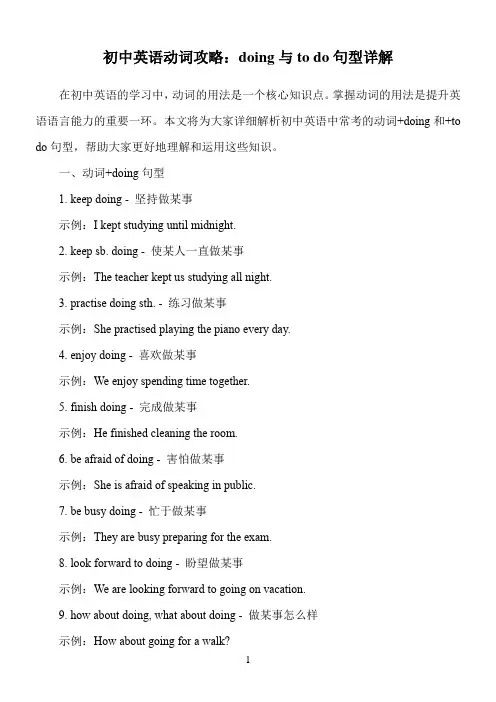
初中英语动词攻略:doing与to do句型详解在初中英语的学习中,动词的用法是一个核心知识点。
掌握动词的用法是提升英语语言能力的重要一环。
本文将为大家详细解析初中英语中常考的动词+doing和+to do句型,帮助大家更好地理解和运用这些知识。
一、动词+doing句型1. keep doing - 坚持做某事示例:I kept studying until midnight.2. keep sb. doing - 使某人一直做某事示例:The teacher kept us studying all night.3. practise doing sth. - 练习做某事示例:She practised playing the piano every day.4. enjoy doing - 喜欢做某事示例:We enjoy spending time together.5. finish doing - 完成做某事示例:He finished cleaning the room.6. be afraid of doing - 害怕做某事示例:She is afraid of speaking in public.7. be busy doing - 忙于做某事示例:They are busy preparing for the exam.8. look forward to doing - 盼望做某事示例:We are looking forward to going on vacation.9. how about doing, what about doing - 做某事怎么样示例:How about going for a walk?10. spend some time (in) doing - 花时间做某事示例:He spent the whole afternoon playing video games.11. feel like doing - 想做某事示例:I feel like taking a walk in the park.12. stop, keep, prevent …from doing - 阻止某人做某事示例:The policeman stopped them from entering the building.13. thank sb for doing - 感谢某人做某事示例:Thank you for helping me with my homework.14. do some cooking, cleaning, reading, shopping, washing - 做点饭、打扫一下卫生、读点书、逛逛街、洗洗衣服。
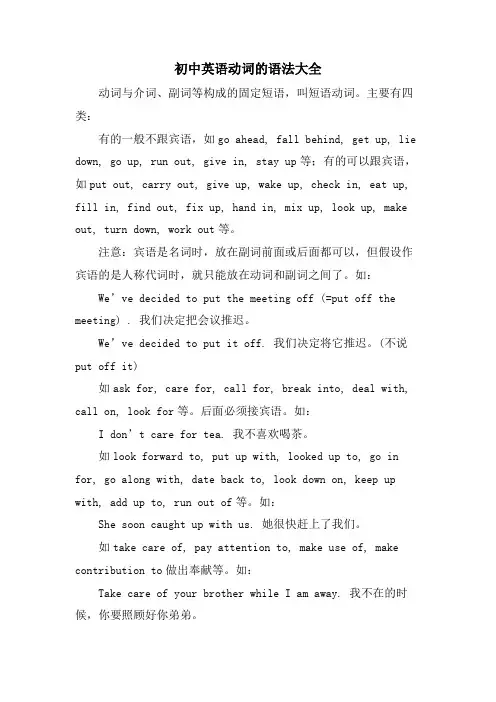
初中英语动词的语法大全动词与介词、副词等构成的固定短语,叫短语动词。
主要有四类:有的一般不跟宾语,如go ahead, fall behind, get up, lie down, go up, run out, give in, stay up等;有的可以跟宾语,如put out, carry out, give up, wake up, check in, eat up, fill in, find out, fix up, hand in, mix up, look up, make out, turn down, work out等。
注意:宾语是名词时,放在副词前面或后面都可以,但假设作宾语的是人称代词时,就只能放在动词和副词之间了。
如:We’ve decided to put the meeting off (=put off the meeting) . 我们决定把会议推迟。
We’ve decided to put it off. 我们决定将它推迟。
(不说put off it)如ask for, care for, call for, break into, deal with, call on, look for等。
后面必须接宾语。
如:I don’t care for tea. 我不喜欢喝茶。
如look forward to, put up with, looked up to, go in for, go along with, date back to, look down on, keep up with, add up to, run out of等。
如:She soon caught up with us. 她很快赶上了我们。
如take care of, pay attention to, make use of, make contribution to做出奉献等。
如:Take care of your brother while I am away. 我不在的时候,你要照顾好你弟弟。

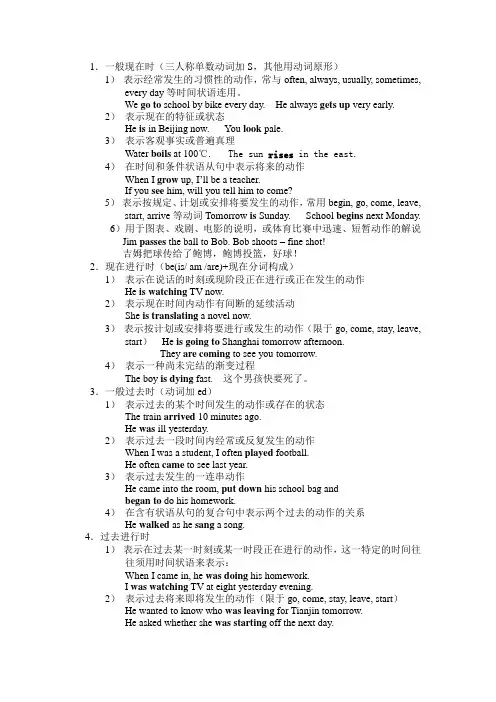
1.一般现在时(三人称单数动词加S,其他用动词原形)1)表示经常发生的习惯性的动作,常与often, always, usually, sometimes, every day等时间状语连用。
We go to school by bike every day. He always gets up very early.2)表示现在的特征或状态He is in Beijing now. Y ou look pale.3)表示客观事实或普遍真理Water boils at 100℃. The sun rises in the east.4)在时间和条件状语从句中表示将来的动作When I grow up, I’ll be a teacher.If you see him, will you tell him to come?5)表示按规定、计划或安排将要发生的动作,常用begin, go, come, leave, start, arrive等动词Tomorrow is Sunday. School begins next Monday.6)用于图表、戏剧、电影的说明,或体育比赛中迅速、短暂动作的解说Jim passes the ball to Bob. Bob shoots – fine shot!吉姆把球传给了鲍博,鲍博投篮,好球!2.现在进行时(be(is/ am /are)+现在分词构成)1)表示在说话的时刻或现阶段正在进行或正在发生的动作He is watching TV now.2)表示现在时间内动作有间断的延续活动She is translating a novel now.3)表示按计划或安排将要进行或发生的动作(限于go, come, stay, leave, start)He is going to Shanghai tomorrow afternoon.They are coming to see you tomorrow.4)表示一种尚未完结的渐变过程The boy is dying fast. 这个男孩快要死了。
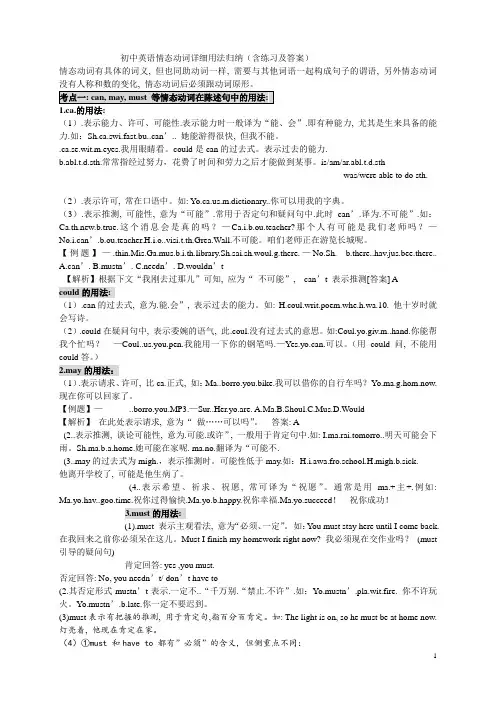
初中英语情态动词详细用法归纳(含练习及答案)情态动词有具体的词义, 但也同助动词一样, 需要与其他词语一起构成句子的谓语, 另外情态动词没有人称和数的变化, 情态动词后必须跟动词原形。
1.ca.的用法:(1).表示能力、许可、可能性.表示能力时一般译为“能、会”.即有种能力, 尤其是生来具备的能力.如:Sh.ca.swi.fast.bu..can’.. 她能游得很快, 但我不能。
.ca.se.wit.m.eyes.我用眼睛看。
could是can的过去式。
表示过去的能力.b.abl.t.d.sth.常常指经过努力,花费了时间和劳力之后才能做到某事。
is/am/ar.abl.t.d.sthwas/were able to do sth.(2).表示许可, 常在口语中。
如: .m.dictionary..你可以用我的字典。
(3).表示推测, 可能性, 意为“可能”.常用于否定句和疑问句中.此时can’.译为.不可能”.如:Ca.th.new.b.true.这个消息会是真的吗?—Ca.i.b.ou.teacher?那个人有可能是我们老师吗?—No.i.can’.b.ou.teacher.H.i.o..visi.t.th.Grea.Wall.不可能。
咱们老师正在游览长城呢。
【例题】—.thin.Mis.Ga.mus.b.i.th.library.Sh.sai.sh.woul.g.there.—No.Sh.__b.there..hav.jus.bee.there..A.can’.B.mustn’.C.needn’.D.wouldn’t【解析】根据下文“我刚去过那儿”可知, 应为“不可能”, can’t 表示推测[答案] Acould的用法:(1).can的过去式, 意为.能.会”, 表示过去的能力。
如: H.coul.writ.poem.whe.h.wa.10. 他十岁时就会写诗。
(2).could在疑问句中, 表示委婉的语气, 此.coul.没有过去式的意思。
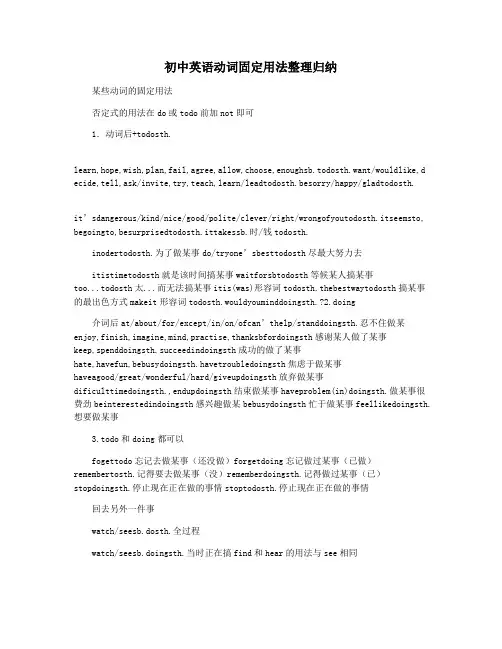
初中英语动词固定用法整理归纳某些动词的固定用法否定式的用法在do或todo前加not即可1.动词后+todosth.learn,hope,wish,plan,fail,agree,allow,choose,enoughsb.todosth.want/wouldlike,d ecide,tell,ask/invite,try,teach,learn/leadtodosth.besorry/happy/gladtodosth.it’sdangerous/kind/nice/good/polite/clever/right/wrongofyoutodosth.itseemsto, begoingto,besurprisedtodosth.ittakessb.时/钱todosth.inodertodosth.为了做某事do/tryone’sbesttodosth尽最大努力去itistimetodosth就是该时间搞某事waitforsbtodosth等候某人搞某事too...todosth太...而无法搞某事itis(was)形容词todosth.thebestwaytodosth搞某事的最出色方式makeit形容词todosth.wouldyouminddoingsth.?2.doing介词后at/about/for/except/in/on/ofcan’thelp/standdoingsth.忍不住做某enjoy,finish,imagine,mind,practise,thanksbfordoingsth感谢某人做了某事keep,spenddoingsth.succeedindoingsth成功的做了某事hate,havefun,bebusydoingsth.havetroubledoingsth焦虑于做某事haveagood/great/wonderful/hard/giveupdoingsth放弃做某事dificulttimedoingsth.,endupdoingsth结束做某事haveproblem(in)doingsth.做某事很费劲beinterestedindoingsth感兴趣做某bebusydoingsth忙于做某事feellikedoingsth.想要做某事3.todo和doing都可以fogettodo忘记去做某事(还没做)forgetdoing忘记做过某事(已做)remembertosth.记得要去做某事(没)rememberdoingsth.记得做过某事(已)stopdoingsth.停止现在正在做的事情stoptodosth.停止现在正在做的事情回去另外一件事watch/seesb.dosth.全过程watch/seesb.doingsth.当时正在搞find和hear的用法与see相同like/lovetodosth暂时性地喜欢去做like/lovedoingsth一直都很喜欢做needtodo 表主动needdoing表被动start/begintodo/doingsth.开始1词语释意exciting/excitedboring/boredamazing/amazedrelaxing/relaxedembassedconfusedplea sed/pleasant动作和结果looklookforlistenputon动作seefindhearwear状态或结果四个花费人spend…onsth./doingsth.→:ispent5yuanonthebook./buyingthebook.人pay…forsth.→ipaid5yuanforthebook.物cost…→thebookcostme5yuan.ittakessb….todosth.→ittakesme5yuantobuythebook.各种时态用法通常现在heis14yearsold.ialwaysstudyhere.通常将来hewillbe14yearsold.iwillstudyherenextyear.通常过去hewas14yearsold.istudiedherelastyear.现在展开iamworkingherenow.过去展开iwasworkingherethistimelastyear.现在顺利完成ihaveworkedherefor3years/since3yearsago.过去顺利完成ihadworkedherefor3yeaslastyear.各种则表示将来的结构1.begoingtodosth.立足现在将来的意图根据现在的迹象预测2.willdosth.将来必须出现的动作/状况客观将来例子:1.sheisgoingtobeateacher.lookatthoseclouds.it’sgoingtorain.2.shewillworkheren extyear.iwillbe14yearsoldnextyear.3.现在展开表中将来只则表示加速度的词例如:go,move,leave,start,arrove,return,flywhereareyougoing?iamflyingtoshanghaitommo w.4.一般现在表将来if/when,until等从句遵循主将从现原则2。
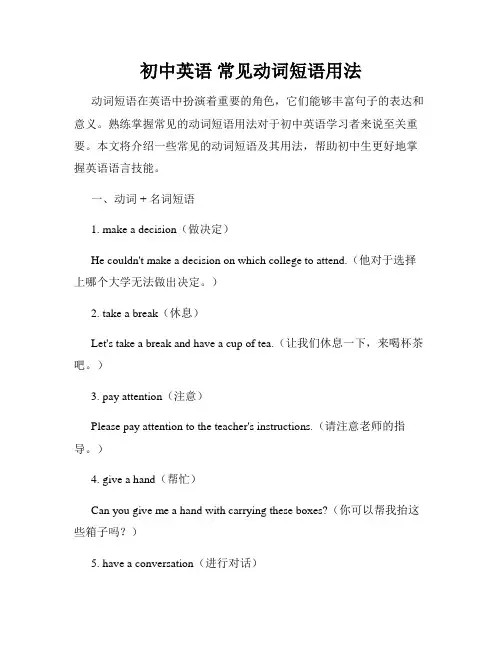
初中英语常见动词短语用法动词短语在英语中扮演着重要的角色,它们能够丰富句子的表达和意义。
熟练掌握常见的动词短语用法对于初中英语学习者来说至关重要。
本文将介绍一些常见的动词短语及其用法,帮助初中生更好地掌握英语语言技能。
一、动词 + 名词短语1. make a decision(做决定)He couldn't make a decision on which college to attend.(他对于选择上哪个大学无法做出决定。
)2. take a break(休息)Let's take a break and have a cup of tea.(让我们休息一下,来喝杯茶吧。
)3. pay attention(注意)Please pay attention to the teacher's instructions.(请注意老师的指导。
)4. give a hand(帮忙)Can you give me a hand with carrying these boxes?(你可以帮我抬这些箱子吗?)5. have a conversation(进行对话)We had a conversation about our future plans.(我们就未来的计划进行了一次对话。
)6. take a risk(冒险)She decided to take a risk and start her own business.(她决定冒险开启自己的事业。
)二、动词 + 副词短语1. look forward to(期待)I'm looking forward to the summer vacation.(我正在期待着暑假。
)2. give up(放弃)Don't give up just because it's difficult.(不要因为困难就放弃。
初中英语动词用法总结在初中英语的学习中,动词是一个非常重要的部分。
动词不仅数量众多,而且用法灵活多样。
掌握好动词的用法对于提高英语语言能力至关重要。
下面我们就来详细总结一下初中英语中动词的常见用法。
一、动词的分类1、实义动词实义动词是表示具体动作或状态的动词,如“run(跑)”“eat(吃)”“sleep(睡觉)”等。
实义动词又可以分为及物动词和不及物动词。
及物动词:后面需要接宾语才能表达完整的意思,例如“read abook(读书)”,“write a letter(写信)”。
不及物动词:后面不需要接宾语就能表达完整的意思,例如“come (来)”“go(去)”“sleep(睡觉)”。
2、系动词系动词本身有词义,但不能单独作谓语,必须和表语一起构成谓语,说明主语的性质、状态、特征等。
常见的系动词有“be(是)”“seem(似乎)”“look(看起来)”“feel(感觉)”“sound(听起来)”“taste(尝起来)”“smell(闻起来)”等。
3、助动词助动词本身没有词义,不能单独作谓语,只能和主要动词一起构成谓语动词,表示时态、语态、语气等。
常见的助动词有“do(用于一般现在时和一般过去时的否定句和疑问句中)”“does(用于一般现在时主语是第三人称单数的否定句和疑问句中)”“did(用于一般过去时的否定句和疑问句中)”“have/has(用于现在完成时中)”“had(用于过去完成时中)”“will/shall(用于一般将来时中)”“would/should(用于过去将来时中)”等。
4、情态动词情态动词本身有一定的词义,但不能单独作谓语,只能和主要动词一起构成谓语动词,表示说话人的语气、态度、情感等。
常见的情态动词有“can(能够)”“could(能够,can 的过去式)”“may(可以)”“might(可以,may 的过去式)”“must(必须)”“need(需要)”“should(应该)”“would(愿意)”等。
初中英语高频动词用法大汇总相信同学们每次遇到选填to do, doing还是do形式的题目时,脑海中的反应大概都是“to do好像通,不对,应该是doing,还是填原形do呢”?其实每节英语课上老师都会提到一些to do, doing, do,你也许也在笔记上认真的记了,可是由于没有及时复习加之这些用法分散在笔记本、课本和练习册等各个地方,并不能系统的记忆。
今天小编就帮大家总结一下初中阶段高频出现的一些动词用法,让大家从此告别看到to do, doing, do就一脸懵的囧状。
一. 加to do的高频考查动词1. afford to do 负担的起做某事We can’t afford to make any mistakes.我们承担不起任何失误。
2. agree to do 同意做某事Do you agree to have dinner today? 今天你同意一块吃饭吗?3. choose to do 选择做某事Why do so many choose to leave their country? 为什么有这么多人要离开祖国?4. decide to do 决定做某事She decided to accept the offer. 她决定接受这一提议。
5. expect to do 期待做某事The shop expects to make more money this year. 这家店铺期望今年多赚点钱。
6. hope to do 希望做某事I hope to see you again sometime next year. 我希望明年某一时候再见到你。
7. hurry to do 急忙做某事We shall have to hurry to get there in time. 我们将不得不及时赶到那。
8. manage to do 设法做成某事How do you manage to do such a thing? 你是怎么设法做这样的事?9. plan to do 打算做某事Where do you plan to spend your holiday? 你打算去哪里度假?10. prefer to do 宁愿做某事I prefer to travel in the front of the car. 我宁愿坐在汽车的前面。
【初中英语】初中英语语法大全之动词用法【—之动词】一般是表示动作中状态的词叫做动词。
下面就是老师为同学们带来的关于动词的具体介绍。
供同学们参考。
1)表示动作中状态的词叫做动词。
2)根据其在句中的功能,动词可分为四类,分别是:实义动词(NotionalVerb)、系动词(LinkVerb)、助动词(AuxiliaryVerb)、情态动词(ModalVerb)。
说明:有些情况下,有些动词是兼类词,例如:Wearehavingameeting.我们正在开会。
(having是实义动词。
)HehasgonetoNewYork.他已去纽约。
(has是助动词。
)3)动词根据其后是否带有宾语,可分为两类,分别是:及物动词(TransitiveVerb)、不及物动词(IntransitiveVerb),缩写形式分别为vt.和vi.。
说明:同一动词有时可用作及物动词,有时可用作不及物动词。
例如:Shecandanceandsing.她能唱歌又能跳舞。
(sing在此用作不及物动词。
)ShecansingmanyEnglishsongs.她能唱好多首英文歌曲。
(sing用作及物动词。
)4)根据是否受主语的人称和数的限制,可分两类,分别是:限定动词(FiniteVerb)、非限定动词(Non-finiteVerb)例如:Shesingsverywell.她唱得很好。
(sing受主语she的限制,故用第三人称单数形式sings。
)ShewantstolearnEnglishwell.她想学好英语。
(tolearn不受主语she的限制,没有词形变化,是非限定动词。
说明:英语中共有三种非限定动词,分别是:动词不定式(Infinitive)、动名词(Gerund)、分词(Participle)。
5)根据动词的组成形式,可分为三类,分别是:单字词(One-WordVerb)、短语动词(PhrasalVerb)、动词短语(VerbalPhrase)例如:TheEnglishlanguagecontainsmanyphrasalverbsandverbalphrases.英语里有许多短语动词和动词短语。
英语动词用法大全一、什么是动词动词是用来表示主语做什么(即行为动词),或表示主语是什么或怎么样(即状态动词)的词,例如:The gir runs fast.(这个女孩跑得快。
)runs表示主语的行为She is a gir.(她是个女孩。
)is与后面的表语a gir表示主语的状态二、动词的分类动词可以按照含义及它们在句中的作用分成四类,即行为动词(也称实义动词)、连系动词、助动词和情态动词。
do的动词用法do a puzzle 玩拼图do a survey 做一个调查do an experiment 做一个实验do one's homework 做作业do some exercises 做练习do one's best 尽某人最大努力do sports 做运动do The dishes 洗碗碟go的动词用法go to The park 去公园go swimming 去游泳go fishing 去钓鱼go shopping 去购物go along 沿着….走go through 通过,经受go over 复习,检查go up(价格)上涨,建造起来go away 离开go down 降低,落下go out 外出,熄灭go back 回去go for a walk 去散步go home 回家go on a diet 节食go sightseeing 去观光go skating 去溜冰go sking 去滑雪go to bed 去睡觉go to school 去上学go to The cinema 去看电影go to work 去上班playplay football 踢足球play basketball 打篮球play The violin 拉小提琴play The drum 打鼓play with…玩...... play chess 下象棋play baseball 打棒球play computer games 玩电脑游戏play volleyball 打排球play table tennis 打乒乓球play The piano 弹钢琴play The guitar 弹吉她play The flute 吹笛子play The trumpet 吹小号look的动词用法look at 看look up 查找,向上看look out 当心look in 拜访look through 翻阅,浏览look after 照顾look around 四下查看look forward to 盼望have的动词用法have a picnic 进行一次野餐have a party 举行一个派对have breakfast 吃早餐have lunch 吃午餐have a match 举行一个比赛have a bath洗澡have a Chinese class 上语文课have a cold 感冒have a fever 发烧have a good time 玩得开心have a headacShe 头痛have a look 看一看have a rest 休息have a stomachacShe 胃痛have a trip 去旅游have a try 试一试have been to 到过have fun 玩得开心come的动词用法come back 回来come from 来自come in 进来come on 上演;开始;赶快come true 实现come up 走近see的动词用法see a movie/film 看电影get的动词用法get along with 与…相处get home 到家get in 进入get off 下车get on 上车get over 越过get ready for 为…做准备get rid of 除去get together 积聚get up 起床give的动词用法give back 归还give in 屈服give up 放弃:停止give way to 让步,退却:屈服于look的动词用法look after 照顾,看管look around 东张西望look at 注视,着眼于look back 回顾look for 寻找:期待,期望look forward to 盼望,期待look like 看起来像look out 向外看,注意,当心make的动词用法make a mistake 弄错make certain 确信,把…弄清楚make friends with 和….交友make a model 制作一个模型make a snowman 堆雪人make kites 制作风筝make The bed 铺床put的动词用法put up 张贴,举起put out 伸出,扑灭put off 推迟put on 穿戴,上映put aside 放到一边put back 放回put down 放下,镇压put up wth 忍受,容忍take的动词用法take a seat 就座take a shower 淋浴,洗澡take away 拿走,减去,夺去take care of 当心,注意,照顾take off 脱去,除去,离开,起飞 take part in 参与,参加take place 发生,举行take it easy 别着急,放松take pictures 照相turn的动词用法turn against 背版,采取敌对态度turn back 折回,往回走turn down折叠,翻下,驳回,拒绝考虑turn into 走进:变成,变为turn off 关上(自来水、电器开关)turn on 打开(自来水,电器开关)call的动词用法call up 打电话call out 大喊,高叫cut的动词用法cut down 砍倒,削减cut up 连根拔除,切碎hand的动词用法hand in 交上,提交hand out 分发keep的动词用法keep up with 跟上keep from 克制,阻止keep away from 避开,不接近keep on 继续,坚持下来pick的动词用法pick up 拾起pick out 挑选run的动词用法run after 追逐,追捕run away 逃跑run off 跑掉,迅速离开run out of 用完set的动词用法set up 建立set off 激起,引起think的动词用法think of 想起,考虑,对...看法think out(自然)想出办法think about 考虑think over 仔细考虑hear的动词用法hear of 听说,得知hear about 听到....hear from 接到...的信talk的动词用法talk about 讨论…. talk with/to 和….讨论stand的动词用法stand out 突显,引人注目stand up 起立,站起来ride的动词用法ride a horse 骑马ride a bicycle 骑自行车其她常用词组sit down坐下stand up起立listen to.. 听....wake up 唤醒depend on 依靠...wait for 等待...laugh at 嘲笑...grow up 成长cut out 剪下be full of.. 充满....be afraid of.. 害怕.....agree with 同意....belong to 属于....arrive in/at 到达……try on 试穿……leave for 离开前往sell out 卖完,售完show up 出席;露面watch TV 看电视行为动词行为动词(实义动词)是表示行为、动作或状态的词。
初中英语动词用法Aact v. 表演,演戏act as sb./ sth. 充任某角色,担任某工作I don’t understand English, so you have to act as my interpreter(翻译)。
其他用法:act for 代表某人,代理某人的职位During her illness, her lawyer has been acting for her in her business.在她生病期间,她的律师一直代理她的业务。
add v. (1)加,增加,添加add sth. to sth. 往...里添加... eg. If the tea is too strong, add some water to it.eg. He added his signature to the petition(请愿书)。
add A and B (together) 加eg. If you add 5 and 5, you get 10.add to sth. 增加某事物eg. The bad weather only add to our difficulties.这种坏天气更增加了我们的困难。
(2) 补充;继续说eg. “I’ll come here later.’’ he added.add in 包括...在内eg. Don’t forget add me in. 别忘了把我算上。
add up 合计,加起来add up to 总计达到add fuel to the fire 火上浇油afford v. 负担得起(...的费用,损失,后果),买得起;抽得出时间(常与can, could, be able to 连用)afford sth. eg. I’d love to go on holiday but I can’t afford the time.eg. They walked because the can’t afford a taxi.afford to do sth. eg. They walked because they can’t afford to take a taxi.eg. I have to work hard because I can’t afford to loose my job.agree v. 同意,赞同agree with sb. 同意某人的意见eg. I agree with you.agree on + 表示具体协议的文件、计划、行动的词eg. We agreed on the plan.agree to do sth. 同意做某事eg. We agreed to start early.agree that + 宾语从句eg. She agreed that I was right.其他用法:agree with sb. (尤用于否定或疑问句) (对某人的健康或胃口)适合I like mushrooms but unfortunately they don’t agree with me.我喜欢吃蘑菇,可惜吃了以后难受。
初中英语使役动词及其用法全汇总使役动词用于表示让人做事或使物发生其中一种变化。
以下是几个常见的初中英语使役动词及其用法:1. Let用法:Let后接名词或代词宾语,表示"让人做事",常用结构为"let + 宾语 + 动词原形"。
例句:Let me help you with your homework.(让我帮你做作业。
)2. Make用法:Make后接名词或代词宾语,表示"强迫人做事",常用结构为"make + 宾语 + 动词原形"。
例句:My parents make me study every night.(我父母强迫我每晚都学习。
)3. Have用法:Have后接名词或代词宾语,表示"让人做事",常用结构为"have + 宾语 + 动词原形"。
例句:I had my brother clean my room.(我让我弟弟打扫了我的房间。
)4. Get用法:Get后接名词或代词宾语,表示"让人做事",常用结构为"get + 宾语 + 动词原形"。
例句:He got his sister to buy him a new toy.(他让他的妹妹给他买了一个新玩具。
)5. Help用法:Help后接名词或代词宾语,表示"帮助人做事",常用结构为"help + 宾语 + 动词原形"。
例句:Can you help me carry these books?(你能帮我拿这些书吗?)需要注意的是,使役动词后的动词一般使用原形。
同时,不同的使役动词在用法上可能有一些区别,需要根据具体语境和需要选择合适的使役动词使用。
初中英语动词用法Aact v. 表演,演戏act as sb./ sth. 充任某角色,担任某工作I don’t understand English, so you have to act as my interpreter(翻译)。
其他用法:act for 代表某人,代理某人的职位During her illness, her lawyer has been acting for her in her business.在她生病期间,她的律师一直代理她的业务。
add v. (1)加,增加,添加add sth. to sth. 往...里添加... eg. If the tea is too strong, add some water to it.eg. He added his signature to the petition(请愿书)。
add A and B (together) 加eg. If you add 5 and 5, you get 10.add to sth. 增加某事物eg. The bad weather only add to our difficulties.这种坏天气更增加了我们的困难。
(2) 补充;继续说eg. “I’ll come here later.’’ he added.add in 包括...在内eg. Don’t forget add me in. 别忘了把我算上。
add up 合计,加起来add up to 总计达到add fuel to the fire 火上浇油afford v. 负担得起(...的费用,损失,后果),买得起;抽得出时间(常与can, could, be able to 连用)afford sth. eg. I’d love to go on holiday but I can’t afford the time.eg. They walked because the can’t afford a taxi.afford to do sth. eg. They walked because they can’t afford to take a taxi.eg. I have to work hard because I can’t afford to loose my job.agree v. 同意,赞同agree with sb. 同意某人的意见eg. I agree with you.agree on + 表示具体协议的文件、计划、行动的词eg. We agreed on the plan.agree to do sth. 同意做某事eg. We agreed to start early.agree that + 宾语从句eg. She agreed that I was right.其他用法:agree with sb. (尤用于否定或疑问句) (对某人的健康或胃口)适合I like mushrooms but unfortunately they don’t agree with me.我喜欢吃蘑菇,可惜吃了以后难受。
The humid climate in the south didn’t agree with him.他不适应南方潮湿的气候。
aim v. 瞄准,对准aim at 瞄准,针对aim at the target 瞄准目标/ 靶子;aim at a success 志在成功eg. My remarks were not aim at you. 我的话不是针对你。
allow v. 允许,准许allow doing sth. eg. We don’t allow smoking in our house. 在我们家不允许抽烟。
allow sb. to do sth. eg. They allow her to go to the party. 他们允许她去参加晚会。
allow sb. in/ out/ up 允许某人进来/ 出去/ 起来annoy v. 使恼怒,使生气annoy sb. 使某人生气,使某人心烦eg. I was annoyed by his remarks. 他的言论激怒了我。
appear v. 出现;露面;(公开)演出appear to do 好象是It appears that + 从句eg. It appears to me that you are all wrong. 我觉得你们全都错了。
appreciate v. 感激appreciate sth. appreciate doing sth.argue v. 争论,争吵argue with sb. about/ over/ on sth. 与某人争论某事eg. We argued with the waiter about the price of the meal.其他用法:argue sb. into/ out of doing sth. 说服某人做/ 不做某事eg. They argue his into giving up his plan.arrive v. 到达arrive in + 大地方eg. We arrived in Paris.arrive at + 小地方eg. We arrived at the station/ my nation town.其他用法:arrive at sth. 达成或得出某事物arrived at an agreement(达成协议)/ a conclusion(得出结论)What dicision did you arrived at? 你们做出了什么决定?ask v. 询问,问ask sth. eg. May I ask questions?ask sb. sth. eg. He asked me the way to the supermarket.He asked me their names.He asked me where he should go.ask sb. about sth. eg. He asked me about my health.ask sb.to do sth. eg. He ask me to stop smoking.He ask me not to swim here.ask for sth. (to do sth.) 请求eg. She asked for more time (to think it over). 她请求多一点时间(仔细考虑)。
ask for sb. 找(某人)Did anyone ask for me last week?其他用法:ask the way 问路;ask for trouble 自找麻烦,自讨苦吃attempt v. 企图,试图试图做某事attempt to do sth.attempt doing sth.Bbeat v. 打败,战胜beat sb. (at sth.) 在某方面打败/ 胜过某人He beats me at chess. 他在下棋方面胜我一筹。
beat sb. 打某人become v. 成为,变成become + 名词He became a doctor at last.become interesting in 变得对...感兴趣其他用法:What becomes/ will become of sb./ sth.? 某人某事的情况如何eg. What will become if I die? 假如我死了我的孩子会怎么样呢?begin v. 开始begin to do sth. = begin doing sth. 开始做某事begin with 由...开始eg. We will begin with you. 从你开始。
eg. The concert(音乐会) began with a piano solo(钢琴独奏). behave v. 举止,表现behave well/ badly 表现好/ 不好,举止良好/ 不好believe v. 相信,认为believe sb. 相信某人说的话eg. I believe him. 我相信他的话。
believe in sb. 相信/ 信任某人eg. I believe in him. 我相信他。
believe sb. + adj. eg. I believe him honest. 我相信他是诚实的。
believe + 从句eg. I believe that he can do the job well.belong v. 属于belong toborrow v. 借,借入,借进borrow sth.( from sb.) 从某地/ 某人处借... borrow a book (from library)bow v. 鞠躬bow to 服从bow to sb’s oppinion 屈从某人的意见make a bow 鞠躬take a bow 鞠躬答谢break v. 打破,违背break into 闯进break away (from …) (从…)逃脱break into/ to pieces 碎成片break up with sb. 与某人绝交break sth. off 突然中断、终止某事物break down 汽车抛锚break out 突然发生eg. Fire broke out last night. 夜间突然失火了。
break through sth. 克服eg. break through the difficulties 克服困难bring v. 拿来,取来,带来bring sth. to sb. = bring sb. sth. 把某物带来给某人bring sb./ sth. (with one) 带着某物或某人来eg. He always brings a bottle of wine (with him) when he comes to dinner.bring sth./ sb. back 送回某人/ 某物eg. He brought me back in his car last night. 他昨天晚上开车送我回来的。
Please bring back the book to me tomorrow. 请明天把书带来还我。
bring sb. up 培养,养育eg. He was brought up by his aunt. 他是被他阿姨养大的。